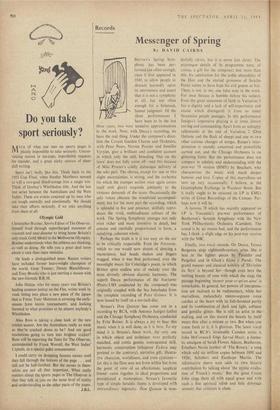Records
Messenger of Spring
By DAVID CAIRNS BRITTEN'S Spring Sym- phony has been per- formed just often enough, since it first appeared in 1949, to allow people to descant learnedly upon its unevenness and assert that it is not a symphony at all; but not often enough for a balanced, honest judgment. Of the three performances I have been to in the last three years, two were tentative approximations to the work. Now, with Decca's recording, we have the real thing. Under the composer's direc- tion the Covent Garden Chorus and Orchestra, with Peter Pears, Norma Procter and Jennifer Vyvyan, give a brilliant and confident account in which only the still, brooding 'Out on the lawn' does not fully come off—and this because of Miss Procter's coldly statuesque delivery of the solo part. The chorus, except for one or two slight uncertainties, is strong, and the orchestra (in which the trumpet section once again covers itself with glory) responds jubilantly to the virtuoso demands of the score. Occasionally the solo voices obscure the woodwind accompani- ment, but for the most part the recording, which is splendid in fire and presence, skilfully repro- duces the vivid, multitudinous colours of the work. The Spring Symphony emerges not only even richer and more inventive in detail, but concise and carefully proportioned in form, a satisfying, coherent whole.
Perhaps the truth is it is too easy on the ear to be critically respectable. Even the Nocturne, which no one would now dream of denying a masterpiece, had heads shaken and fingers wagged, when it was first performed, over the moonlight music for Coleridge's poem, in which Britten spins endless arcs of melody over the most divinely obvious diatonic harmony. The superb Decca performance of the Nocturne (Pears/LSO conducted by the composer) was originally coupled with the Sea Interludes from the complete recording of Peter Grimes. It is now issued by itself on a ten-inch disc.
Strauss's Don Quixote has come out in a recording by RCA, with Antonio Janigro (cello) and the Chicago Symphony Orchestra, conducted by Fritz Reiner. It is always a joy to hear this music when it is well done, as it is here. To my mind it is Strauss's finest work, the only one in which object and technique were perfectly matched, and comic genius, contrapuntal skill, harmonic conservatism (whatever Elektra may pretend to the contrary), narrative gift, illustra- tive obsession, worldliness, and even cynicism— for this is the Don seen not from within but from the point of view of an affectionate, sceptical friend - came together in ideal proportions and precipitated a masterpiece. Strauss's favourite type of simple heraldic theme is developed with extraordinary ingenuity. Don Quixote is won- derfully clever, but it is never just clever. The picaresque details of its programme were, of course, a gift for the composer; but, more than this, his admiration for the noble absurdities of the Don and the eternal grossness of Sancho Panza seems to have kept his evil genius at bay. There is not, to me, one false note in the work. For once Strauss is humble before his subject. Even the great statement of faith in Variation .3 has a dignity and a lack of self-importance and excess which distinguish it from so many Straussian purple passages. In this performance Janigro's impressive playing is at times almost too big and commanding. Apart from an unhappy rallentando at the end of Variation 2 (Don Quixote and the flock of sheep) and one or two other curious changes of tempo, Reiner's inter- pretation is soundly conceived and powerfully carried out, and the Chicago Orchestra is on glittering form. But the performance does not compare in subtlety and understanding with the post-war 78 version (HMV) by Beecham, who characterises the music with much deeper humour and love. Copies of this marvellous set turn up very occasionally, 1 believe, at the Gramophone Exchange in Wardour Street. But it really ought to be reissued on LP in EMI's series of Great Recordings of the Century. Per- haps now it will be.
A famous 78 which has recently appeared 'on LP is Toscanini's pre-war performance of Beethoven's Seventh Symphony with the New York Philharmonic Orchestra (Camden). The sound is by no means bad, and the performance has, I think. a slight edge on his post-war version with the NBC.
Finally, two vocal records. On Decca, Teresa Berganza sings eighteenth-century arias. She is best in the lighter pieces by 'Paisiello and Pergolesi and in Gluck's Elena e Paride. The grand manner and classical nobility of `Divinitds du Styx' is beyond her—though even here the melting beauty of tone with which she sings the passage beginning 'Inourir pour ce oleon aitne' is remarkable. In general, her powers of interpreta- tion are inclined to be rudimentary, 'while her marvellous, melancholy mezzo-soprano voice catches at the heart with its full-throated purity and its combination of dark and light, softness and gemlike glitter. She is still an artist in the making, and on this record the beauty by itself wears thin after a minute or two. But when you come fresh to it, it is glorious. The latest vocal record in RCA's invaluable Camden series is John McCormack Sings Sacred Musk, a fantas- tic amalgam of Sarah Flower Adams, Beethoven, Ethelbert Nevin (author of 'The Rosary,' a song which sold six million copies between 1898 and 1928), Schubert and Easthope Martin. The informative sleeve note adds its own bizarre contribution by talking about `the mystic exalta- tion of Franck's music.' But the great Count John sings them all with equal grace and with such a fine spiritual relish and holy debonair serenity that criticism is silent.














































 Previous page
Previous page